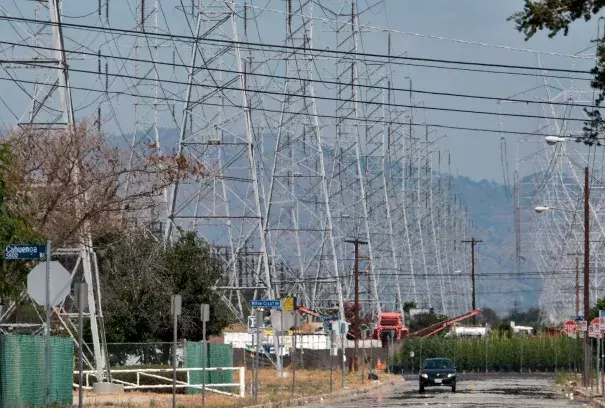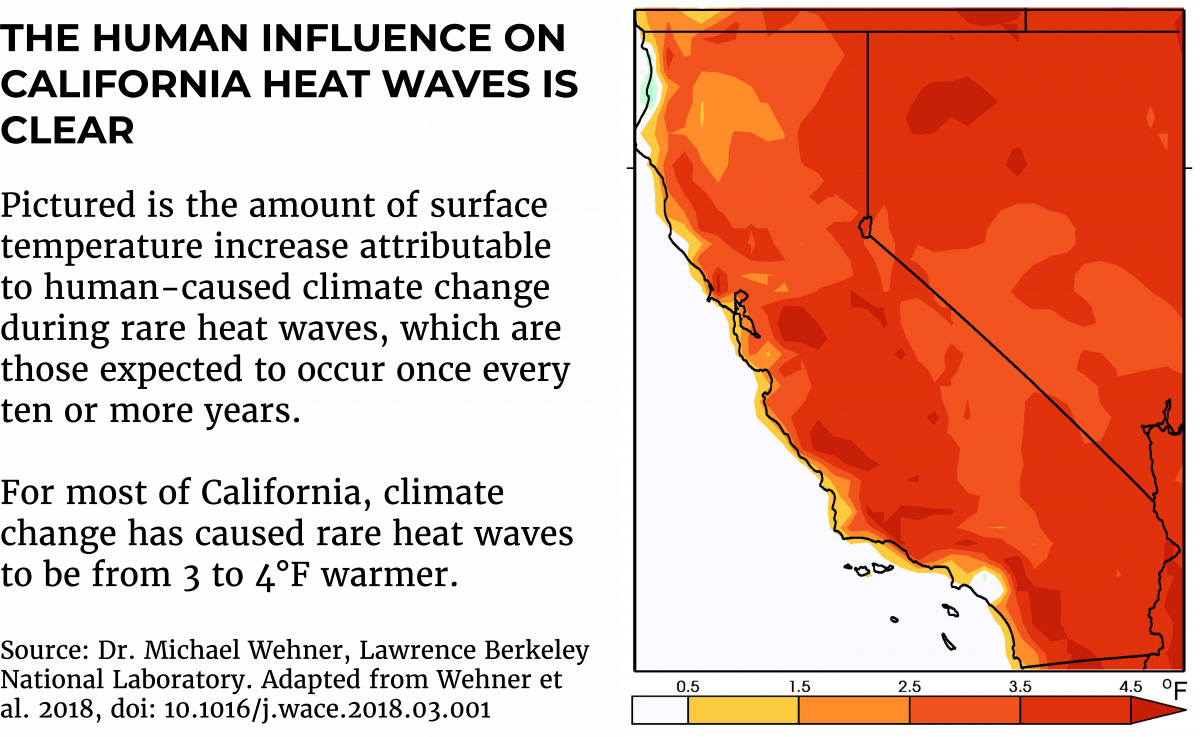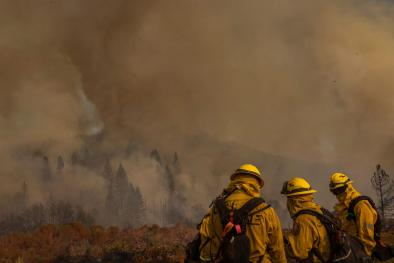California Heat Wave August 2020
An intense, prolonged, and dangerous heat wave set records across California, including 130°F in Death Valley on August 16, potentially the hottest recorded temperature in world history. Many aspects of the heat wave, including the extreme high temperatures, number of consecutive days with temperatures over 100°F, high overnight lows, and high humidity, align with the impacts of climate change. Michael Wehner, a climate scientist at Lawrence Berkeley National Laboratory, says “for most of California, climate change has caused rare heat waves to be from 3 to 4 degrees Fahrenheit warmer.”
The heat wave is having wide-ranging impacts on human health, wildfires, and electricity demand, including the development of a rare fire tornado and the first rolling blackouts since 2001. UCLA climate scientist Daniel Swain predicts, “This event will probably end up being one of the most significant widespread California extreme heat events in the past decade, if not longer.”

 Climate science at a glance
Climate science at a glance
The human influence on heat waves is clear. For most of California, climate change has caused rare heat waves to be from 3 to 4 degrees Fahrenheit warmer.
Dr. Michael Wehner, Lawrence Berkeley National Laboratory
- Half of all record-breaking heat waves would not have broken records without climate change.[1]
- Summer heat waves are now five times more likely to occur due to climate change.[2]
- In most US regions, humid heat extremes doubled in frequency from 1980-1999 to 2000-2019.[3]
- There has been a dramatic increase in hot nighttime temperatures in the US, reducing the number of critically important relief windows during heat waves.[4]
- For the period 2004-2018, Indigenous communities had the highest rate of heat-related deaths and Black communities had the second-highest.[5]
- Global warming contributed to the record for hottest day of the year in at least 82 percent of the records for hottest day over the 1961-2010 period.[6]
- Heat domes increased in intensity over the entire Northern Hemisphere during the summer months from 1979 to 2010.[7]
- For more information on how climate change is exacerbating heatwaves, read here.
Background
Extreme heat compounds risks to vulnerable populations amid the coronavirus pandemic
The heat wave arrived just as California became the first state to surpass 600,000 cases, and although the state is seeing encouraging trends, the week prior to the heat wave averaged over 9,000 new cases and 130 new deaths per day.
Extreme heat and COVID-19 create a vicious cycle. The influx of COVID-19 patients, and the precautions taken to limit the spread of the virus, lower hospitals' ability to handle heat stroke and other heat-exacerbated cases. Many hospitals in California are stretched thin.
High unemployment driven by the pandemic increases economic insecurity, and people unable to afford air conditioning have to choose between staying home where it’s dangerously hot, or going to cooling centers or public spaces where the risk of contracting the virus is higher. For those who can afford air conditioning, social distancing means more people are cooling off at home, which drives up electricity demand and challenges energy infrastructure.
California issued first rolling blackouts since 2001 amid record heat
On Friday, August 14, extreme heat triggered power outages throughout California as the state's power grid became overwhelmed by energy demands. The "Stage 3 emergency alert" declared on Friday evening by the California Independent System Operator was the first statewide emergency of this kind since 2001. A Stage 3 emergency means the state power grid is not meeting demand and rotating power outages may be necessary. More than 300,000 customers in both Northern and Southern California were without power at points Friday evening.
Historical context for Death Valley's 130°F temperature record
A temperature of 130°F (54.4°C) was recorded in Death Valley, California, at 15:41 on Sunday, August 16, breaking the 129.2°F readings at Death Valley in 2013 and in Kuwait in 2016. While the reading needs to be formally verified, it is likely to set a record for the highest temperature ever recorded, with scientists linking the extreme heat to climate change.
The hottest temperature on record is sometimes considered to be 134°F (56.7°C), set in July 1913 also in Death Valley, but that reading may be inaccurate. A detailed analysis in 2016 concluded that the reading was “essentially not possible from a meteorological perspective” and likely to be an error. With the 1913 reading discounted, along with another incorrect reading in Libya and other inaccurate readings, this weekend’s temperature may be the highest ever accurately recorded.
As the planet continues to warm, it is inevitable that we will continue to see records fall. It now appears that we’ve crossed yet another worrying threshold, setting the apparent hottest temperature ever recorded on this planet since valid records have been kept, a scorching 130°F (54.4°C) in Death Valley CA. Of course, that record too shall fall soon enough if we continue to pollute the atmosphere with carbon dioxide from the burning of fossil fuels and other human activities.
Michael Mann, Director of the Earth System Science Center, Pennsylvania State University
Climate signals breakdown
Climate signal #1: Extreme heat and heat waves
The clearest signal of climate change is the increase in the frequency and intensity of extreme heat events. As greenhouse gas emissions trap additional heat close to the Earth's surface, temperatures that were once rare become commonplace and the likelihood of seeing extreme and record-hot temperatures increases. The continued burning of fossil fuels and increasing greenhouse gas emissions means that heat records don't last long as warming continues. The US has experienced record breaking heat every summer in recent years, and the six hottest years on record globally all occurred during the past six years.
The number of local record-breaking average monthly temperature extremes worldwide is now on average five times larger than expected in a climate with no long-term warming.[1] The trend in global warming has contributed to the severity and probability of 82 percent of record-hot days globally.[6]
Observations consistent with climate signal #1
- Death Valley, California hit 129.9°F (54.4°C) at 3:41 p.m. PDT Sunday, August 16, 2020, which was rounded to 130°F in the final report from NOAA. The observation may be the hottest reliably recorded temperature in world history, breaking the 129.2°F readings at Death Valley in 2013 and in Kuwait in 2016.
- A dozen Bay Area cities tied or set new daily heat records as temperatures soared across the Bay Area on August 14.
Climate signal #2: Humidity and Heat Stress Increase
Exposure to extreme heat is already a significant public health problem and the primary cause of weather-related mortality in the US.[8] As temperatures rise due to global warming, people's exposure to extreme heat conditions increases.[9] The dramatic increase in nighttime temperatures in the US is particularly concerning, because cooler nighttime temperatures provide an important window of relief during heat waves.[4]
Heat is especially dangerous with high humidity, because it reduces the human body's ability to cool off by sweating. The Heat Index, also known as the "real feel" temperature, is a measure of how hot it really feels when relative humidity is factored in with the actual air temperature. As air warms, its capacity to hold water vapor increases, and measurements show that atmospheric humidity is increasing around the globe.[9] In the US, humid heat extremes doubled in frequency from 1980-1999 to 2000-2019 in most regions.[3]
Observations consistent with climate signal #2
- The National Weather Service warned: "There will be very little to no overnight relief with lows in the 70s to 80s. Significant heat impacts are expected for the general public, especially for those sensitive to the heat, including pets and livestock."
Climate signal #3: Atmospheric blocking increase
The widespread and intense heat wave is due to a stagnant high pressure weather pattern that has created a vast area of sweltering heat sometimes referred to as a "heat dome." Heat domes often form what are known as blocking patterns in the jet stream, which halt the west-to-east movement of weather, causing weather conditions to persist for long periods. Atmospheric blocking often causes weather extremes in the mid-latitudes,[10] and research indicates that rising temperatures may increase the frequency of atmospheric blocking events.[11] One analysis identifies an increase in the intensity of persistent high pressure areas over the entire Northern Hemisphere during the summer months from 1979 to 2010.[7]
Observations consistent with climate signal #3
- According to CBS meteorologist Jeff Berardelli, "The cause of the current heat wave is a giant ridge of hot air, also known as a heat dome, in the mid- and upper levels of the atmosphere, redirecting the jet stream and cooler air into the eastern half of the nation. Statistically speaking, the core of the heat dome is forecast to intensify to 3 standard deviations above the mean, meaning it is more intense than 99.8% of such events in the history of that area."
- Michael Mann, Director of the Earth System Science Center at Pennsylvania State University, sees a strong resemblance between the conditions underlying the extreme heat in California in August 2020 and conditions during extreme summer weather across the Northern Hemisphere in 2018, both linked to jet stream behavior. “I would venture a guess that the same atmospheric phenomena…that was responsible for that setup, and the unusually persistent weather extremes in Europe and elsewhere at that time, are playing a role here too." Research indicates that summers like 2018 will be 50 percent more frequent by the end of the century due to climate change.[12]
Related Content









